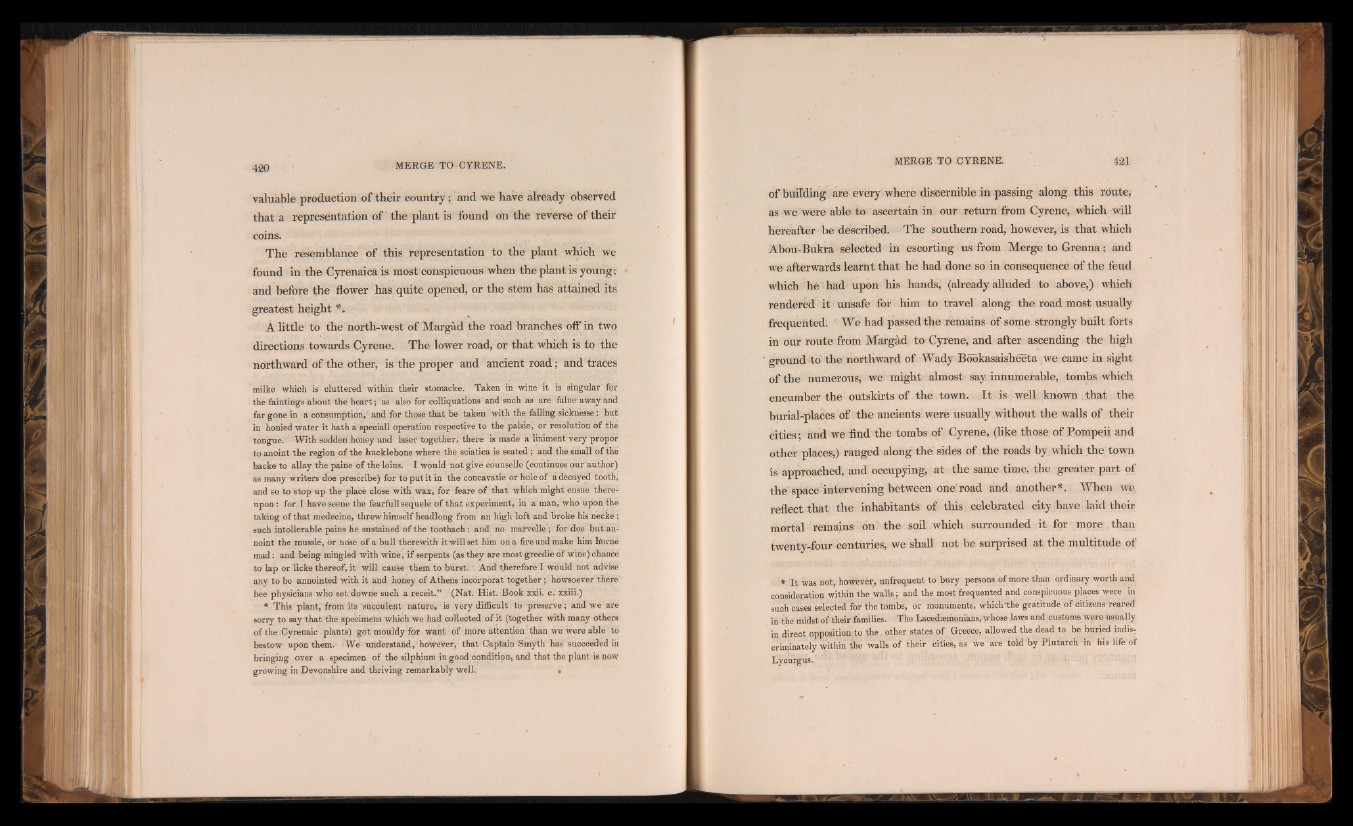
valuable production of their country ; and we have already observed
that a representation of the plant is found on the reverse of their
coins.
The resemblance of this representation to the plant which we
found in the Cyrenaica is most conspicuous when the plant is young;
and before fhe flower has quite opened, or the stem has attained its
greatest height *.
A little to the north-west of Margàd the road branches off in two
directions towards Cyrene. The lower road, or that which is to the
northward of the other, is the proper and ancient road ; and traces
milke which is cluttered within their stomacke. Taken in wine rt is singular for
the faintings about the heart ; as also for colliquations and such as are falne away and
far gone in a consumption, and for those that be taken with the falling sicknesse : but
in honied water it hath a speciall operation respective to the palsie, or resolution of the
tongue. With sodden honey and laser together, there is made a liniment very propor
to anoint the region of the hucklebone where the sciatica is seated ; and the small of the
backe to allay the paine of the loins. I would not give counselle (continues our author)
as many writers doe prescribe) for to put it in the concavatîè or hole of a decayed tooth,
and so to stop up the place close with wax, for feare of that which might ensue thereupon
: for I have séene the fearfull sequele of that experiment, in a man, who upon the
taking of that med'ècine, threw himself headlong from an high loft and broke his necke ;
such intolerable pains hë sustained of the toothach : and no marvelle ; for doe but an-
noint the inusslé, or nose of a bull therewith it will set him on a fire and make him lforne
mad : and being mingled with wine, if serpents (as they are most greedie of wine) chance
to lap or licke thereof, it will cause them to burst. And therefore I would not advise
any to be annointed with it and honey of Athëns incorporât together ; howsoever there'
bee physicians who'set downe such a receit.” (Nat. Hist. Book xxii. c. xxiii.)
* This plant, from its succulent nature, is very difficult to preserve ; and we are
sorry to say 'that -the specimens which we had collected of it (together with many others
of the Cyrenaic plants) got mouldy for want of more attention than we were able to
bestow upon them. We understand, however, that Captain Smyth has succeeded in
bringing over a specimen of the silphium in good condition, and that the plant is now
growing in Devonshire and thriving remarkably well. •
of building are every where discernible in passing along this route,
as we were able to ascertain in our return from Cyrene, which will
hereafter be described. The southern road, however, is that which
Abou-Bukra selected in escorting us from Merge to Grenna; and
we afterwards learnt that he had done so in consequence of the feud
which he had upon his hands, (already alluded to above,) which
rendered it unsafe for him to travel along the road most usually
frequented. ' We had passed the remains of some strongly built forts
in our route from Margad to Cyrene, and after ascending the high
ground to the.northward of Wady Bookasaisheeta we came in sight
of the numerous, we might almost say innumerable, tombs which
encumber the outskirts of the town. I t is well known that the
burial-places of the ancients were usually without the walls of their
cities; and we find the tombs of Cyrene, (like those of Pompeii and
other places,) ranged along the sides of the roads by which the town
is approached, and occupying, at the same time, the greater part of
the space intervening between one road and another*. When we
reflect that the inhabitants of this celebrated city have laid their
mortal remains on the soil which surrounded it for more than
twenty-four centuries, we shall not be surprised at the multitude of
* It was not, however, unfrequeat to bury persons of more than ordinary worth and
consideration within the walls; and the most frequented and conspicuous places were in
such cases selected for the tombs, or monuments, which the gratitude of citizens reared
in the midst of their families. The Lacedaemonians, whose laws and customs were usually
in direct opposition to the . other states of Greece, allowed the dead to be buried indiscriminately
within the walls of their cities, as we are told by Plutarch in his life of
Lycurgus.